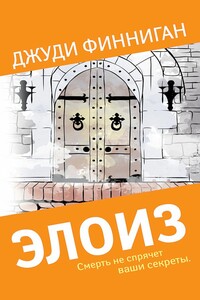Spider in the Corner of the Room - [10]
I lower myself into the chair, my prison suit clinging to my skin, a stench of body odour jeering me. I am a mess. I hate to be in this state, out of control, in disarray. Allowing my body to slacken, I let my arm hang behind me. My fingers trace the cross, etched into the wall. I almost smile, because wherever I go, it is there: religion. All the priests, their rules. All of them controlling my mind, dictating life to me and everyone else, to a people, to a country, a government. Franco may have long died in Spain, but the Church will always be there.
I shake my head. Whether I want him to be or not, he is not in here now, the priest-he can’t be. So think. I must think if I want to get out of here. This is all just logic. The strip search. The incarceration. The segregation. Isolation. Fear. Panic.
I sit forward. Panic. Could that be it?
I glance at the door. Thick metal. Locked. Only one way out. Standing, I examine the room. Small. Three metres by five metres. One plastic chair: green, no armrest. One bed: mattress, no covers. Floor: rubber, bare. Walls: brick, half plastered in gunmetal grey.
I begin with my breathing; I draw in quick, sharp breaths, forcing myself to hyperventilate. It takes just over one minute, but, finally, it is done. My head swells and I try to ignore the dread in my stomach spreading through my body. I move to the cell door and bang hard, but my effort is lost in a sudden outbreak of shouts from the inmates across the walkway. I wince at the noise, count to ten, make a fist, bang again. This time: success. A guard shouts my name; she is coming over. I estimate it will take her seven seconds to reach my cell. I count. One, two, three, four. At five, I thrust my fingers down my throat. On seven, the window shutter opens above my head and a guard peers through.
‘Oh, shit!’
I vomit. My lunch splatters the floor.
A bolt unlocks. I count to three. One-two-three. I stumble, clutch my chest.
When the guard bursts in, she halts and mutters a swear word under her breath.
‘Martinez? You all right?’
I groan. Another guard enters. ‘Leave her! She’s bloody well fine.’
The guard by my side hesitates.
‘Come on!’ shouts the other.
My chance is slipping away. ‘Help,’ I croak, retching.
‘I’m sorry,’ crouching guard says, ‘but I think you are-’
I vomit. It sprays all over the floor, over the guard.
‘Oh, fuck.’
I mumble some words, but sick is lodged in my throat and it sounds as if I am choking.
‘Get a doctor!’ the guard shouts to her colleague. ‘Now!’
Chapter 4
The guard props me up against the wall. The brick is cold on my skin.
‘Is this cell five?’
There is a woman blocking the light by the cell door. She wears no uniform, has no baton.
The guard scowls at her. ‘Who the hell are you?’
The woman steps forward. Blonde hair snakes in a ponytail down her back. ‘I’m Dr Andersson,’ she says, her voice clipped, plum, like a newsreader. ‘Lauren Andersson, how do you do.’ She extends a neat little hand; the guard stands, ignores it.
Dropping her arm, Dr Andersson looks at me. ‘She needs to be out of here. Now.’
‘Hang on a minute,’ says the guard. ‘Who the hell put you in charge? I only want you to check her over.’
‘I’m responsible for the physical and psychiatric well-being of the inmates here,’ Dr Andersson says, side-stepping the vomit. She points to me. ‘This woman is Maria Martinez.’ She folds her arms. ‘And she has been assigned to me.’
‘Since when?’
‘Since today.’ She pushes past the guard, crouches down and takes my wrist. She looks to her watch, checks my pulse, releases my arm. ‘This inmate’s pulse is up. Get her out. Now.’ When the guard does nothing, Dr Andersson stands, her neck taut, voice raised. ‘I said, now.’
I am hauled up under the arms by two guards. Dr Andersson informs them that I am, under no circumstances, to be returned to the segregation cell.
‘I have the full backing of the Governor,’ she says. ‘Do you understand?’
The guards nod.
‘Good. Take her to my office.’
‘So, how are you feeling?’
I don’t know how to answer the question. I am in Dr Andersson’s office. She is sitting at her desk, staring at me. The room is cool, the light low. My pulse has dropped, but still my muscles tense, my fists clench. Everything is disorientating me.
Dr Andersson crosses her legs and her hem slips above her knee. Her cheeks are pink and she has eyes shaped like over-sized almonds.
‘My throat is sore,’ I say, touching my neck, avoiding eye contact.
‘That is to be expected, given the vomiting.’ She swivels to her right and picks up a blood pressure monitor. She opens the strap. ‘Can you roll up your sleeve?’
‘Why?’
‘Blood pressure. You know. Routine.’
I hesitate, then slowly pull up the arm of my jumpsuit to find an apple-sized bruise. I gasp.
‘You did that in the cell?’
‘I think so. I do not remember.’
She peers at it, then after slipping the strap around my bicep, begins pumping the pressure valve. The sound of wheezing fills the air.
‘That was a panic attack you had just now,’ she says, watching the valve. ‘Do you have them often?’
‘Yes.’ I watch the dial turn, try to breathe, remain clam. ‘You can stop now.’

Бешеная скорость, проселочная дорога и обрыв. В одну секунду все, что было дорого Симону, исчезло. Родители, дом… У Симона остались лишь тетя и старший брат. Жизнь с чистого листа кажется ему невыносимой. Каждую ночь снятся кошмары: голоса и шепот волков зовут его в лес. Симона действительно тянет в лес, в заброшенный лесной отель. Вместе со своей новой подругой Каро он может часами бродить среди деревьев. Но последнее время о лесах Фаленберга поговаривают недоброе – будто там пропадают девушки. Симону кажется, что он знает, кто к этому причастен…

Самоубийством покончил жизнь шестнадцатилетний юноша. Его мать не верит в добровольный уход. Оказывается — все нити тянутся к отцу погибшего мальчика…и сатанистской секте!

Зуав играет с собой, как бы пошло это не звучало — это правда. Его сознание возникло в плавильном котле бесконечных фантастических и мифологических миров, придуманных человечеством за все время своего существования. Нейросеть сглаживает стыки, трансформирует и изгибает игровое пространство, подгоняя его под уникальный путь Зуава.

Впервые на русском — дебютный роман молодой англичанки Фионы Мозли, вошедший в шорт-лист Букеровской премии 2017 года. Критики не скупились на похвалы: «ошеломительный дебют… доподлинное чудо…» (Evening Standard), «искусно выстроенная современная притча, выдающееся достижение» (Times Literary Supplement). Газета Guardian охарактеризовала этот роман как «сельский нуар, пропитанный мифами и легендами заповедного Йоркшира», а Sunday Times — как «приключения Ганзеля и Гретель в мире „Крестного отца“». Итак, добро пожаловать в Элмет — так называлось королевство древних бриттов, располагавшееся на территории современного Йоркшира.

Кэти тяжело переживает смерть близкой подруги Элоиз — самой красивой, интересной и талантливой женщины на свете. Муж Кэти, психиатр, пытается вытащить жену из депрессии. Но терапия и лекарства не помогают, Кэти никак не может отпустить подругу. Неудивительно, ведь Элоиз постоянно приходит к ней во сне и говорит загадками, просит выяснить некую «правду» и не верить «ему». А потом и вовсе начинает мерещиться повсюду. И тогда Кэти начинает сомневаться: на самом ли деле ее подруга мертва?

Лили скрывает травмирующее прошлое под колючей внешностью, но в третьей книге эксперт по карате опускает свою защиту, на достаточно долго время, чтобы помириться с семьей и помочь раскрыть ряд ужасных убийств. Вернувшись в родной город Бартли (в двух шагах от места, где она живет в Шекспире, штат Арканзас) на свадьбу сестры Верены, Лили с головой погружается в расследование о похищении восьмилетней давности. После того, как ее бывший возлюбленный и друг Джек Лидз (частный сыщик с сомнительным прошлым) приезжает, чтобы проверить анонимную подсказку, что похититель и пропавшая девочка находятся в Бартли.